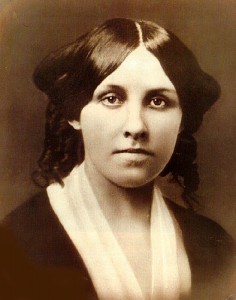“Good books, like good friends, are few and chosen; the more select the more enjoyable.” Louisa May Alcott
One of the most enjoyable parts of writing about the 19th century is discovering the books my characters might have read and discussed. It’s fun to learn about the kinds of stories children and adults enjoyed, curled up beside the fire on a cold winter’s afternoon, or lying on a blanket on a sunny morning listening to the burbling of the river. This week, I’ve been reading up on the books that were popular in the mid to late 1800’s. The works of a few authors, for example, Louisa May Alcott, Mark Twain, Jane Austen, Frances Hodgson Burnett, and Henry James are still read and discussed today. Other authors, such as William Dean Howells were very popular in their day but are largely forgotten now.
 What gives the books that have endured their staying power? Is it the subject matter? Authorial voice? Or an undefinable “something” that keeps readers engaged? I think it might be all three. Plus a longing for what we perceive as a simpler time. I thought about this notion of perception this week as I finished reading a very short but compelling novel by an author new to me, Andrew Sean Greer. In The Story of a Marriage, the narrator, Pearlie Cook, speaks about the 1950’s and about how we still idealize those first post WW2 years when suburbs blossomed everywhere, jobs were plentiful, mothers stayed home to rear their children, and neighbors looked out for one another. But Pearlie, a black woman, recalls the ugly side of those years–the executions of suspected spies Ethel and Julius Rosenburg, the Jim Crow laws, the McCarthy hearings. Air raid drills. Bomb shelters. Books allow us to preserve our illusions, to dream of what might be possible, to hope for the future.
What gives the books that have endured their staying power? Is it the subject matter? Authorial voice? Or an undefinable “something” that keeps readers engaged? I think it might be all three. Plus a longing for what we perceive as a simpler time. I thought about this notion of perception this week as I finished reading a very short but compelling novel by an author new to me, Andrew Sean Greer. In The Story of a Marriage, the narrator, Pearlie Cook, speaks about the 1950’s and about how we still idealize those first post WW2 years when suburbs blossomed everywhere, jobs were plentiful, mothers stayed home to rear their children, and neighbors looked out for one another. But Pearlie, a black woman, recalls the ugly side of those years–the executions of suspected spies Ethel and Julius Rosenburg, the Jim Crow laws, the McCarthy hearings. Air raid drills. Bomb shelters. Books allow us to preserve our illusions, to dream of what might be possible, to hope for the future.
I’ve loved books since childhood. Every time I move, the movers complain about my 50 or so cartons of books. The last time we moved, as one of the guys was lugging a carton up here to my second floor office, he said to me, “The next time you move, don’t call me.”
I didn’t even tell him about the ten cartons of books I had reluctantly purged from my collection before the move. A few authors are “off limits” when it comes to editing my library. I won’t give up anything by Eudora Welty, Reynolds Price, Pat Conroy, Alice McDermott, Gail Godwin, or half a dozen other of my favorite Southern writers. Their books are more than paper and ink, they are a part of who I am. So they stay.
What books have you chosen to be a part of your permanent library? What gives them their staying power?